
In 1954, the Presidium of the Supreme Soviet transferred the Crimean Oblast to the Ukrainian SSR from the Russian SFSR. The territory had been recognized within the Soviet Union as having "close ties" to the Ukrainian SSR, and the transfer itself commemorated the Union of Russia and Ukraine Tercentenary. Amidst the dissolution of the Soviet Union in 1991, the Ukrainian SSR seceded from the Soviet Union and Ukraine continued to exercise sovereignty over the territory as the Autonomous Republic of Crimea. For just over two decades after 1991, Russia did not dispute the Ukrainian administration in Crimea, but retracted this stance on 18 March 2014, when Crimea was annexed by Russia after coming under Russian military occupation. The Soviet-era transfer of Crimea has remained a topic of contention between the two countries in light of the Russo-Ukrainian War, as the Russian government has stated that the Ukrainians must recognize Russia's sovereignty over the territory as part of any negotiated settlement to end the Russian invasion of Ukraine, which began in 2022.
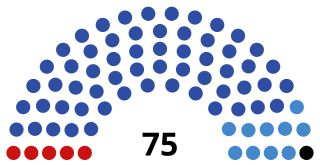
The State Council of Crimea is the parliament of the Russia-administered Republic of Crimea. It claims to be a continuation of the 'Supreme Council of Crimea' following a vote by the Ukrainian parliament to dissolve the Supreme Council of Crimea. The Parliament is housed in the Parliament building in the centre of Simferopol.
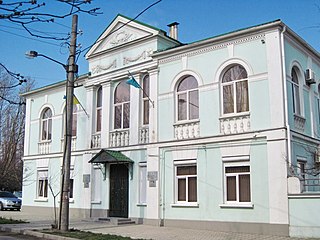
The Mejlis of the Crimean Tatar People is the single highest executive-representative body of the Crimean Tatars in period between sessions of the Qurultay of the Crimean Tatar People. The Mejlis is a member institution of the Platform of European Memory and Conscience.
The politics of Crimea today is that of the Republic of Crimea on one hand, and that of the federal city of Sevastopol on the other, within the context of the largely unrecognised annexation of Crimea by the Russian Federation in March 2014.

The Crimean People's Republic or Crimean Democratic Republic was a self-declared state that existed from December 1917 to January 1918 in the Crimean Peninsula. The Republic was one of many short-lived states that declared independence following the 1917 Russian Revolution caused the collapse of the Russian Empire. The Crimean People's Republic was the First Turkic and Muslim Democratic Republic in the World.

The Council of Ministers of the Autonomous Republic of Crimea, briefly SovMin, is the executive branch of government of the Autonomous Republic of Crimea, a republic within southern Ukraine that is currently suspended due to Russian occupation of the Crimean Peninsula since February 27, 2014. The Council of Ministers derived its authority from the Constitution and laws of Ukraine and normative acts of the Verkhovna Rada of Crimea which bring them into its competency.
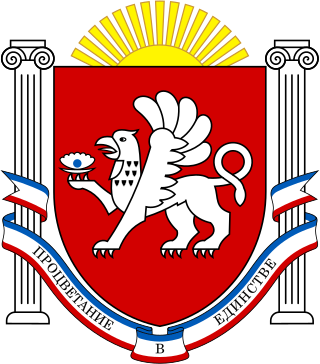
Verkhovna Rada of Crimea or the Supreme Council of Crimea, officially the Supreme Council of the Autonomous Republic of Crimea, was the acting Ukrainian legislative body for the Autonomous Republic of Crimea before the annexation of Crimea by Russia in 2014.

Anatolii Volodymyrovych Mohyliov is a Ukrainian politician. He served as the prime minister of Crimea and the Ukrainian minister of Internal Affairs.
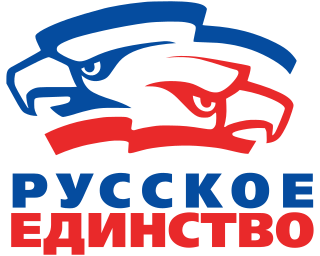
Russian Unity was a political party in Crimea, registered in October 2008. A Kyiv Court banned the party "from activity on the territory of Ukraine" on 30 April 2014. Party leader Sergey Aksyonov was instrumental in making possible the annexation of Crimea by the Russian Federation. The party was based in Crimea, which has a Russian-speaking majority. The party was dissolved on 5 May 2014.

Refat Abdurahman oglu Chubarov is a Crimean politician and public figure, leader of the Crimean Tatar national movement in Ukraine and worldwide.
The Crimean status referendum of 2014 was a disputed referendum on March 16, 2014, concerning the status of Crimea that was conducted in the Autonomous Republic of Crimea and the city of Sevastopol after Russian forces seized control of Crimea.

Sergey Valeryevich Aksyonov is a Russian politician serving as the head of the Republic of Crimea since 9 October 2014, a territory internationally recognised as part of Ukraine.
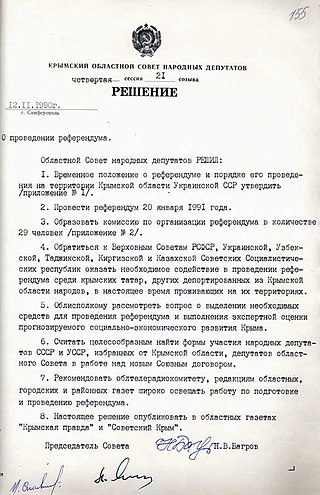
A referendum on autonomy was held in the Crimean Oblast of the Ukrainian SSR on 20 January 1991, two months before the 1991 All-Union referendum. Voters were asked whether they wanted to re-establish the Crimean Autonomous Soviet Socialist Republic, which had been abolished in 1945. The proposal was approved by 94% of voters.
The annexation of Crimea by the Russian Federation took place in the aftermath of the 2014 Ukrainian revolution. On 22–23 February, Russian President Vladimir Putin convened an all-night meeting with security services chiefs to discuss pullout of deposed President, Viktor Yanukovych, and at the end of that meeting Putin remarked that "we must start working on returning Crimea to Russia.". Russia sent in soldiers on February 27, 2014. Crimea held a referendum. According to official Russian and Crimean sources 95% voted to reunite with Russia. The legitimacy of the referendum has been questioned by the international community on both legal and procedural grounds.

Vladimir Andreyevich Konstantinov is a Crimean and Russian politician who has served as the Chairman of the State Council of the Republic of Crimea since 17 March 2014.

The Autonomous Republic of Crimea is an administrative division of Ukraine encompassing most of Crimea that was annexed by Russia in 2014. The Autonomous Republic of Crimea occupies most of the peninsula, while the City of Sevastopol occupies the rest.

In February and March 2014, Russia invaded the Crimean Peninsula, part of Ukraine, and then annexed it. This took place in the relative power vacuum immediately following the Revolution of Dignity. It marked the beginning of the Russo-Ukrainian War.
The Crimean problem or the Crimean question is a dispute over the status of Crimea between Ukraine and Russia. The dispute began during the dissolution of the Soviet Union, but did not escalate into a conflict until the 2014 Ukrainian revolution, when Russian special forces were deployed to occupy Crimea and took over its government buildings. The official results of an internationally unrecognized referendum held during the occupation allegedly indicated overwhelming support for Russian annexation. The Crimean parliament and the autonomous city of Sevastopol unilaterally declared independence from Ukraine to ideally form a country named Republic of Crimea. Russia then annexed the region and created two federal subjects, the Republic of Crimea and Sevastopol. Ukraine and the majority of the international community continue to regard Crimea as occupied Ukrainian territory; a United Nations General Assembly resolution declared the referendum invalid and affirmed the territorial integrity of Ukraine. Despite international opinion however, the currency, tax, time zone and legal system are all operational under de facto Russian control. Ukraine has attempted to resolve the matter by filing litigation in multiple international criminal, environmental, political, and other courts.

The Head of the Republic of Crimea is the highest official and the head of the executive power of the Republic of Crimea; an internationally disputed federal subject of the Russian Federation located on the Crimean Peninsula.
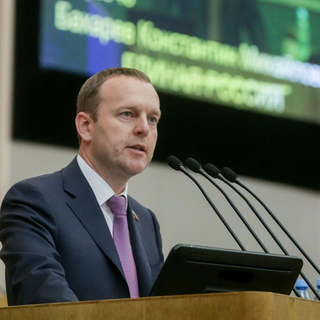
Konstantin Mikhailovich Bakharev, is a Russian and former Ukrainian politician and journalist. He has been a member of parliament of the Russian State Duma, since 5 October 2016, and Deputy Chairman of the State Duma Committee on Financial Markets since 24 October 2019. He is also a member of the Presidium of the General Council of the United Russia party, and the head of the interregional coordinating council of the party in the Southern Federal District.

















